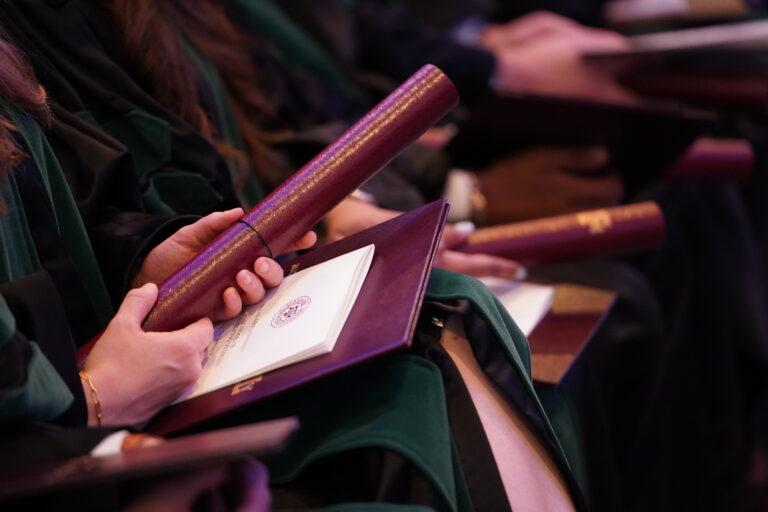EnMed Courses and Curriculum Model
At Texas A&M School of Engineering Medicine, we partner with top-rated Houston Methodist Hospital, putting you at the forefront of medicine. Our innovative medical curriculum uniquely blends medical and engineering sciences with biodesign principles, offering the only simultaneous Masters of Engineering and Medical Doctorate program completed in four years.

A Three-Phase Model
Innovation Immersion Experiences
ITDE 640 – 642As part of your training, you will participate in three Innovation Immersion Experiences (IIEs) which provide hands-on experience in developing and testing early-stage medical technologies.
Summer Pre-matriculation Course
Pre-Matriculation consists of a six-week intensive course to overview concepts and skills at the intersection of engineering and medicine and to introduce the fundamentals of the biodesign process, ranging from needs finding and screening (Identify), through conceptualization and prototyping (Invent), and into pre-clinical testing and commercialization strategies (Implement).
Pre-clerkship
The second phase (Pre-Clerkship), runs approximately a year and a half and is taught using a flipped-classroom, student-centered approach with an emphasis on interactive and team-based learning, interlaced with hands-on labs, workshops, and other engaging experiences to develop key clinical and engineering skills. In this non-lecture based learning approach, you’ll conduct an overview of fundamental concepts in medical science first, followed by a systematic survey of the primary organ systems.
Clerkship
The final phase (Clerkship) runs approximately two and a half years and consists of required clinical rotations in internal medicine, surgery, family medicine, pediatrics, obstetrics/gynecology, neurology and psychiatry within Houston Methodist Hospital. In addition, you’ll complete emergency medicine, acting internship and intensive care unit and student-selected clinical electives, some of which can be taken at other medical facilities nation-wide. Importantly, a subset of dedicated electives are reserved for you to engage in multiple Innovation Immersion Experiences.
EnMed Course and Curriculum Model
Summer (June – July)
- ITDE 610 – Intro to Engineering Innovation in Medicine
Fall (July – December)
Pre-clerkship Phase
- MEID 605 – Foundations of Medicine I
- MEID 606 – Foundations of Medicine II
- MEID 607 – Medical Gross Anatomy
- MEID 619 – Practice of Medicine (POM) I
- ITDE 611 – Engineering Foundations in Medicine I
Spring (January – May)
Pre-clerkship Phase
- ITDE 612 – Engineering Foundations in Medicine II
- ITDE 614 – Journal Club for Engineering Innovation in Medicine
- MEID 608 – Neuroscience
- MEID 609 – Introduction to Disease
- MEID 616 – Cardiovascular
- MEID 618 – Medical Student Grand Rounds
- MEID 620 – Practice of Medicine (POM) II
Fall (July – December)
Pre-clerkship Phase
- MEID 617 – Respiratory
- MEID 701 – Hematology/Oncology
- MEID 704 – Renal Genitourinary
- MEID 706 – Metabolism/Gastrointestinal/Nutrition
- MEID 707 – Endocrinology and Reproductive Sciences
- MEID 708 – Integument-Musculoskeletal
- MEID 711 – Evidence Based Medicine
- MEID 712 – Practice of Medicine (POM) III
- ITDE 613 – Engineering Foundations in Medicine III
Spring (January – June)
Clerkship Phase
- MEID 685 – Directed Studies (USLME Individual Study/Prep & Exam)
- ITDE 640 – Innovation Immersion in Engineering Design I
- MEID 713 – Transition to Clerkships
- MEID 821 – Practice of Medicine (POM) IV
- ITDE 624 – Engineering Analysis of Clinical Processes (EACP) I
- Core Clerkships (Internal Medicine, Surgery, Family Medicine, Pediatrics, Psychiatry, ObGyn)
Fall (July – December)
Clerkship Phase
- Core Clerkships (Internal Medicine, Surgery, Family Medicine, Pediatrics, Psychiatry, ObGyn)
- MEID 822 – Practice of Medicine (POM) V
- ITDE 624 – Engineering Analysis of Clinical Processes (EACP) II
Spring (January – June)
Clerkship & Transition to Residency (TTR) Phase
- Core Clerkships (Internal Medicine, Surgery, Family Medicine, Pediatrics, Psychiatry, ObGyn)
- Electives & Clerkships
- ITDE 625 – Engineering Analysis of Clinical Processes (EACP) III
Fall & Spring
Transition to Residency (TTR) Phase
- Electives & Clerkships
- ITDE 627 – Engineering Analysis of Clinical Processes (EACP) IV
- ITDE 628 – Engineering Analysis of Clinical Processes (EACP) V
- MEID 823 – Practice of Medicine (POM) VI – Interprofessional Social and Ethical Dilemmas in Healthcare
- MEDI 850 – Practice of Medicine (POM) Capstone